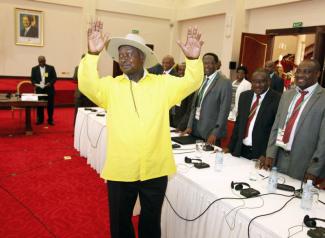Burundi
A pan-regional crisis
 AP Photo/picture-alliance
AP Photo/picture-alliance
In most cases, the perpetrators of violence are not identified. The use of government force is becoming ever more stringent, and armed groups are responding in kind. Daily life has become unbearable. Sexualised violence is increasingly common – and it serves strategic purposes. The government does not investigate human-rights abuses.
For humanitarian agencies, work has become ever more difficult. In November, the home ministry froze the bank accounts of 10 non-governmental organisations. The editorial offices and the broadcasting stations of independent media have been closed and largely destroyed. Over 230 000 people have fled to neighbouring countries.
These Burundian events indicate that the crisis will rock the entire region. The temptation to stay in government office by illegitimate means is great in all neighbouring countries. The irony is that Burundi proves undeniably what risks are involved in undermining constitutional principles for the sake of clinging to power. Constitutions must be respected as sets of rules that safeguard societal peace and political stability. Power-hungry individuals and their cronies must not be allowed to use them as personal tools.
In spite of international and regional criticism, Nkurunzia is staying his course. International sanctions and the freezing of aid money have not made a difference. On the contrary, he is intentionally opening wounds and pitting population groups against one another. It bears repetition that we are witnessing the result of presidential recklessness rather than a clash of ethnic groups.
The Peace and Security Council of the African Union (AU) has, for the first time, authorised the deployment of MAPROBU, a peacekeeping force with 5000 troops. Nkurunziza’s response was that he will not tolerate a “foreign invasion”. To actually start the mission, the AU needs a two-thirds majority of member governments. It is uncertain whether and when such a majority can be mustered without Burundi’s consent.
In the meantime, tensions are growing in neighbouring Rwanda. The two governments accuse one another of causing disorder and providing rebels with safe havens. Uganda’s President Yoweri Museveni has tried to broker compromise between Burundi’s government and opposition, but not accomplished much so far. Museveni himself is controversial, however, as he had his country’s constitution changed to abolish term limits and stay in power. In many people’s eyes, he thus lacks credibility.
At the same time, Burundi’s government is showing very little interest in compromise. It cancelled a round of negotiations in early January after a meeting in Entebbe on 28 December proved fruitless.
Hopes are now pinned on Tanzania, one of the region’s political and economic heavyweights. Former President Jakaya Kikwete had sided with Nkurunzia. It remains to be seen, however, what approach John Magufuli, the new president, will take. He was elected according to constitutional provisions.
Regional pressure on Burundi’s government, which lacks a legitimate mandate by the electorate, must certainly increase for a peaceful solution to be found. Burundi’s political opposition and civil society must be involved in a meaningful way, moreover. This is not simply an African affair, the entire international community must pay attention. A joint strategy of the East African Community and the AU is indispensable, but the EU and the UN must play their part too. Coherent action will be essential for a monitoring and protective mission to be sent to Burundi in cooperation with the AU. There must be an end to daily repression and killing.
To prevent further crises in the region, moreover, it is crucial to tackle the issue of constitutional changes in favour of individual leaders. Clear standpoints are needed right from the start, and policymakers must act in accordance with them. The political and humanitarian crises we are witnessing now are not one nation’s domestic affairs – they may trigger mayhem across the entire world region.
Gesine Ames coordinates Ökumenisches Netz Zentralafrika (Ecumenical Network Central Africa), a German faith-based organisation.
office@oenz.de
